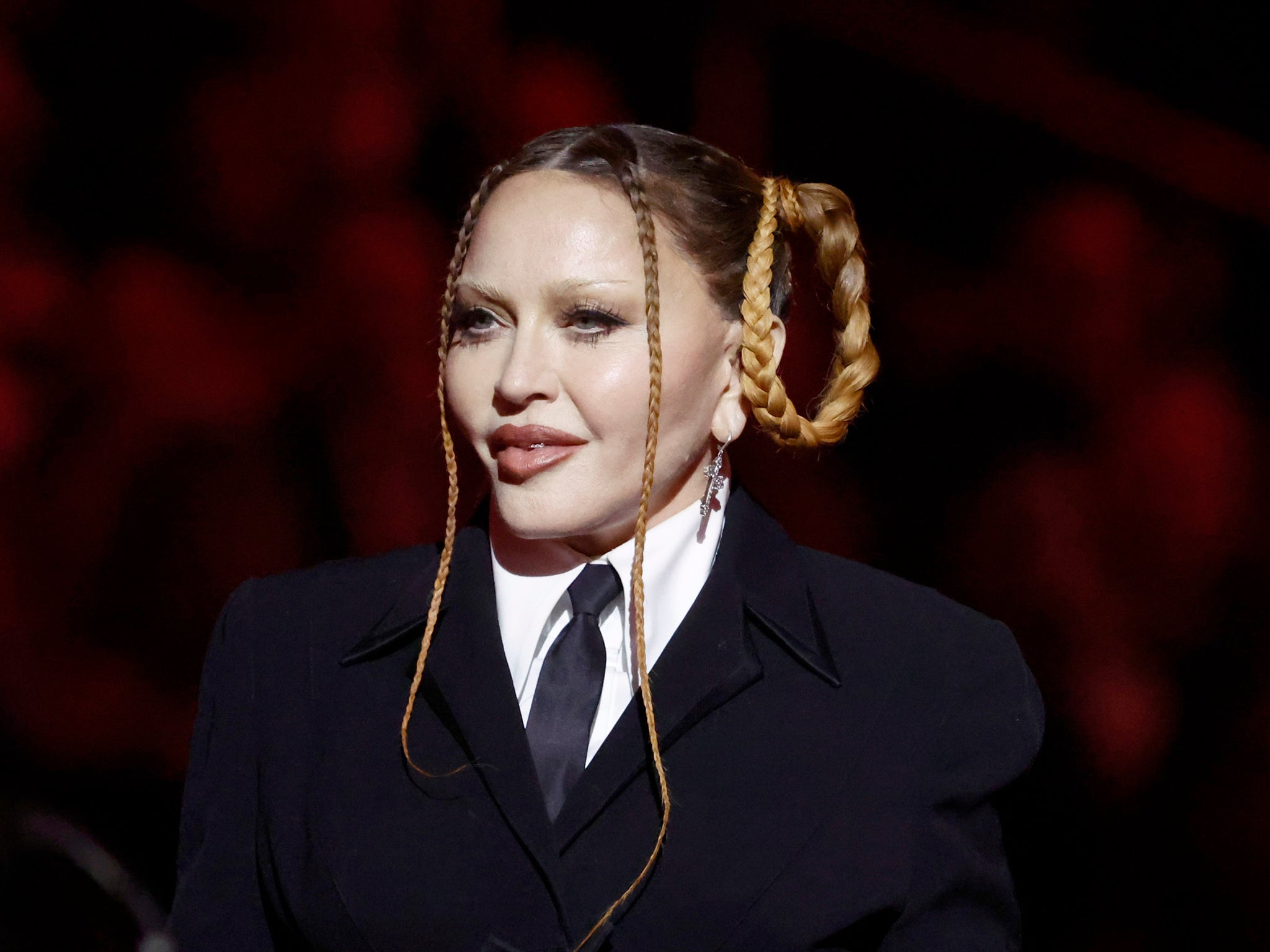Madonna can’t win when it comes to her appearance
The pop icon’s presence at the Grammys on Sunday night led to insults and criticism across the internet but it’s also nothing new for her, writes Ellie Muir. Her face, body, arms and hands have long been fair game for misogyny and faux concern – will it ever stop?


On Sunday night, Madonna appeared at the Grammy Awards wearing an outsized black tuxedo, her eyebrows bleached platinum blonde and her cheeks plumped and smooth. Everyone lost it. Here’s a sampling of responses from Twitter: “Looks like she had a face transplant”; “Madonna received the ‘New Face’ award at the 2023 Grammy Awards!”; “Not the Madonna I remember.” By Monday morning, numerous news outlets had dubbed Madonna “unrecognisable” and were busy ringing up plastic surgeons to ask their opinions on a woman they’d never actually treated.
That the reaction has been entirely critical of the 64-year-old pop icon is unsurprising – Madonna has long been a punching bag for the apparent crimes of not being young, publicly expressing her sexuality and not looking the same as she did half a century ago when she first became famous. This is no exaggeration. In 1993, a Smash Hits magazine spread printed the words “Calm down Grandma!” over a picture of the musician performing at Wembley Stadium. She was 35 at the time.
This treatment has continued, ad nauseam, through every phase of Madonna’s career. In the 2000s, she was lambasted for her arms, with American gossip site TMZ describing them as “bloodcurdling veiny corpse arms”. In another post, they were dubbed “gruesomely muscled arms [that] appear to have been reassembled with the bony remains of a dead cow”. In the music video for her 2006 track “Sorry”, she roller skates with an entourage of young and gorgeous male dancers. Many of the visuals from the song’s parent album, her disco throwback Confessions on a Dancefloor, show Madonna, then aged 47, in a high-rise leotard, rolling around in a dance studio and meeting up in alleyways with objectively ripped dancers. This was nothing particularly interesting for that era of music videos, yet she was still berated for being “too old” for such imagery. By 2016, criticism of Madonna’s appearance had migrated down to her hands, which tabloids declared were too “veiny” and “wrinkly”.
Few weeks seem to go past without Madonna drawing mockery or abuse for how she looks. Earlier this month, TV host Lorraine Kelly brutally likened the star’s face to a “boiled egg”, while Piers Morgan – who has always had a very odd revulsion for Madonna – claimed that she’d become “the most grotesque, trainwreck embarrassment in the history of world entertainment”. It’s long been acceptable to say incredibly vicious things about her in public, with few celebrity figures ever leaping to her defence.
Ultimately, it seems that we like older women to be devoid of individuality or agency, and refuse them the right to be wild, unpredictable or risk-taking. Women who refuse, as Madonna always has, to sit down and be quiet. That’s why critics like Morgan are continually enraged by Madonna’s expressive presence on social media, or describe her modern work as strained or calculated rather than a natural extension of her interests: she’s recently experimented with musical genres like rap and Cape Verdean batuque, while her latest single “Back That Up to the Beat” was released in a sped-up tempo for maximum TikTok appeal. It went viral. She also continues to work with younger artists, lately the bisexual Dominican rap sensation Tokischa, who is 38 years her junior.
What’s also striking about Madonna’s boxing match with ageist standards of sexual expression is that she’s one of the first pop icons to age in front of us so publicly. While many famous singers may retire into lives of tranquility or live off re-releases of old hits – many of her most culture-shifting peers, such as Prince, Michael Jackson and Whitney Houston are also long dead – Madonna remains a working artist still interested in pushing sonic boundaries and working with fresh voices. And so what if she’s still doing it while slithering across the floor?
An ass [photograph] will get you more followers but it will also get you more detractors and criticism
In true Madge fashion, the musician seems unphased by the criticism hurled at her. In a New York Times interview published in 2019, she suggested that journalist Vanessa Grigoriadis was too fixated on the concept of age. “Stop thinking,” she told her. “Just live your life and don’t be influenced by society trying to make you feel some type of way about your age or what it is you’re supposed to be doing.” Much to the dismay of Madonna’s critics, this has always been her approach: be stubborn, be steely, never crumble in the public eye.
Of the criticism of her presence on Instagram, Madonna compared it to a “crime”: “You can’t win [as an older woman] – an ass [photograph] will get you more followers but it will also get you more detractors and criticism. You’re in that funny place.” But she’s also been in that “funny place” for the far majority of her career – a 35-year-old in her bra dubbed “grandma”, now a 64-year-old dubbed “a boiled egg”. Through all that criticism, she’s shrugged. Good for her.
Join our commenting forum
Join thought-provoking conversations, follow other Independent readers and see their replies
Comments


Bookmark popover
Removed from bookmarks